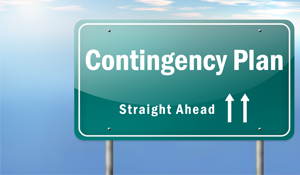A contingency is the occurrence of a potential (or eventual) negative event in the future. The word...
Protect Your Wealth with Contingency Planning
Business owners have had to contend with more than their fair share of challenges during the these unprecedented times to maintain and succeed, and now, we continue to deal with supply chain issues, inflation, employee shortages, and new COVID variants – to name just a few. . .
If we’ve learned anything from the last two years, it’s that life is uncertain. Which is why we need to be as prepared as possible for the unexpected.
As a business owner, you have many people who are dependent on you and your business, including your family members, employees, and customers, which is why you need to have a contingency plan. Have you ever thought about:
- What would happen to them if you should die or become disabled?
- Who would own and run your business?
- If your business should be sold and to whom?
- How your heirs will be taken care of financially?
If you’re like most owners, the value of your business is a significant portion of your wealth, which can make the risks of not having a contingency plan even greater. Premature death and the statistically more likely premature disability can have a tremendously negative impact on a business and the financial well-being of you and your family. Developing a contingency plan for your business is critically important. Let’s take a look at what you need to consider.
Understanding Contingency Planning
Business contingency planning is a risk management strategy that protects against business disruption in case of an unforeseen event by helping you and your colleagues prepare for and respond to an emergency situation. Your plan should outline how your business will continue without you and the detailed information your successors will need to carry on.
A written contingency plan will:
- Provide a roadmap for your business successors and family members.
- Outline who you want to own and operate your business.
- Prevent your business value from plummeting.
- Retain your key employees.
- Ensure your business will continue.
A business contingency plan should not be confused with an estate plan or an owner’s will – all of these need to be in place to protect the family’s financial future.
Why You Need a Contingency Plan If You’re Thinking About Selling Your Business
What many business owners don’t realize is that NOT having a contingency plan in place can negatively impact your business’s value from the perspective of a potential buyer. Buyers are interested in acquiring businesses that function independently from the owner. Developing a contingency plan and a strong management team will ensure that your business can operate without you. This will not only protect your business and dependents in the event that something happens to you, but it will improve your company’s value as well.
Get Started on Your Contingency Planning!
P.S. We also invite you to learn more about all of the business owner resources available to you at no cost at Business Transition Academy. Download a full PDF version of our book Cashing Out of Your Business – Your Last Great Deal ($17.95 value) for FREE and learn how to exit your business on your own terms and for the best price.
Material discussed in this communication is meant to provide general information and should not be acted on without obtaining professional advice tailored to you or your company’s individual and specific needs. Any tax advice contained in this communication (including any attachments) is not intended or written to be used, and cannot be used by any person or entity, for the purpose of (i) avoiding penalties that may be imposed on any taxpayer or (ii) promoting, marketing or recommending to another party any transaction or matter addressed herein. This information is for general guidance only and is not a substitute for professional advice. Information presented is believed to be factual and up-to-date; however, BTA makes no guarantee as to accuracy, completeness, suitability, or validity of any information within this communication and will not be liable for any errors, omissions, or delays in this information or any losses, injuries, or damages from its display or use. Any forward-looking statements are believed to be reasonable; however, BTA gives no assurance that such expectations will prove to be correct.



